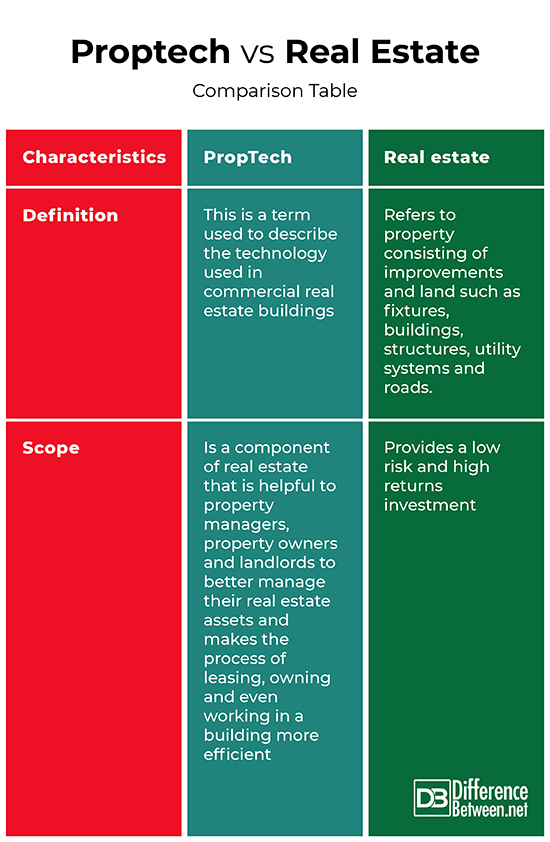Difference Between Proptech and Real Estate
As more people desire to attain financial freedom, various investment strategies have become popular. Purchase of shares, bonds, and real estate property are among the most common investments. Others include money market funds, municipal bond funds, high yield savings accounts, treasury securities, dividend stock funds and certificates of deposit. The real estate sector has seen a boom in the recent past. This is because of the few risks involved not forgetting the high appreciation rate in real estate investments. If you are new in real estate, you may have come across new terms, such as PropTech. In this article, we will discuss the differences between PropTech and real estate.

What is Proptech?
Short of property technology, this is a term used to describe the technology used in commercial real estate buildings. The technology in real estate is usually software in apps or platforms that links with other platforms to provide seamless real estate services.
This technology is helpful to property managers, property owners and landlords to better manage their real estate assets. It hence makes the process of leasing, owning and even working in a building more efficient.
For instance, people who work in a building that has an app may enjoy a variety of services that would otherwise be unavailable if the building does not use PropTech. Services such as visitor registration and ordering food may be accessible via the app or platform in use. The integration of a building’s services on one platform increases efficiency for the users.
Property managers can also collect and maintain the building’s data in one portal. Here, tenants can pay rent, raise their issues and even log in guests. Landlords can use the central portal to alert tenants of new developments in the property.
Here are some of the ways through which PropTech is revolutionizing the real estate industry:
- It is changing the way people interact, sell and buy properties
- It is offering solutions for parties involved in real estate
- It is increasing the efficacy of transactions by streamlining real estate processes

What is Real Estate?
This is real property consisting of improvements and land such as fixtures, buildings, structures, utility systems and roads.
Investments in real estate have become popular due to the low risks involved and the high returns. The main categories of real estate include residential and commercial properties, land and industrial properties.
However, the real estate market is constantly evolving. There are multiple alternative investments that people can hop into, new business models and technologies.
Investors should consider the property location, valuation of the property, the investment horizon and purpose, profit opportunities, expected cash flow, leverage and whether it’s a new or existing property.
Among the advantages of investing in real estate include:
- Has a predictable cash flow
- Appreciates in value
- It is possible to leverage
- Offers long term financial security
- Has a large hedge against inflation
Similarities between Proptech and Real estate
- Both are terms used in relation to investments in the real estate sector
Differences between Proptech and Real estate
Definition
PropTech is a term used to describe the technology used in commercial real estate buildings. On the other hand, real estate refers to property consisting of improvements and land such as fixtures, buildings, structures, utility systems and roads.
Scope
PropTech is a component of real estate that is helpful to property managers, property owners and landlords to better manage their real estate assets and makes the process of leasing, owning and even working in a building more efficient. On the other hand, real estate provides a low risk and high returns investment.
Proptech vs. Real Estate: Comparison Table

Summary of Proptech vs. Real estate
PropTech is a term used to describe the technology used in commercial real estate buildings. On the other hand, real estate refers to property consisting of improvements and land such as fixtures, buildings, structures, utility systems and roads. PropTech is a component of real estate that is revolutionizing the real estate industry by changing the way people interact, sell and buy properties while also offering solutions for parties involved in real estate.
- Difference Between Profit Center and Investment Center - July 2, 2022
- Difference Between Anti-Trust and Anti-Competition - June 6, 2022
- Difference Between Stocktaking and Stock Control - June 6, 2022
Search DifferenceBetween.net :
Leave a Response
References :
[0]Dror Poleg. Rethinking Real Estate: A Roadmap to Technology’s Impact on the World’s Largest Asset Class. Springer Nature, 2019. https://books.google.co.ke/books?id=GCe7DwAAQBAJ&pg=PR4&dq=Difference+between+proptech+and+real+estate&hl=en&sa=X&ved=2ahUKEwjU89ubjNftAhW66uAKHf3LCogQ6AEwAnoECAIQAg#v=onepage&q=Difference%20between%20proptech%20and%20real%20estate&f=false
[1]Baber W. & Khare A. Transforming Japanese Business: Rising to the Digital Challenge. Springer Nature, 2019. https://books.google.co.ke/books?id=DT_CDwAAQBAJ&pg=PA198&dq=Difference+between+proptech+and+real+estate&hl=en&sa=X&ved=2ahUKEwjU89ubjNftAhW66uAKHf3LCogQ6AEwA3oECAMQAg#v=onepage&q=Difference%20between%20proptech%20and%20real%20estate&f=false
[2]Andrew Baum. Commercial Real Estate Investment. Taylor & Francis, 2009. https://books.google.co.ke/books?id=JxZgEVGNHVYC&printsec=frontcover&dq=Difference+between+proptech+and+real+estate&hl=en&sa=X&ved=2ahUKEwityteujNftAhV04uAKHfoPAqA4ChDoATAAegQIAxAC#v=onepage&q&f=false
[3]Image credit: https://indvstrvs.com/wp-content/uploads/2020/01/PropTech-Consolidation-on-the-Cards-in-2020.jpg
[4]Image credit: https://c.pxhere.com/images/51/80/846cb2715c64af3f057367314605-1586145.jpg!d
